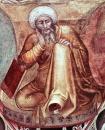Averroes

Averroes was a Muslim legal scholar, philosopher, theologian, and doctor. He was born in 1126 in Cordoba, Andalusia, in a respected Cadi family of judges and lawyers. The young man was educated by talented private tutors, and trained by his father from a young age in the fields of theology and law. Averroes extended his knowledge by learning about the secular sciences of physics, medicine, and astronomy. He soon was an erudite man, passionate about religion, philosophy, and the natural sciences.
He shared his life between Andalusia and Morocco. In 1162, he wrote a medical encyclopedia, the Kulliyat, which brought him considerable fame, was translated in Latin and Hebrew, and became a staple of medical school libraries until the 18th century. Aged only 27, he advised the Almohad Caliph on judicial reform in Marrakesh. In 1170, he was made Qadi (Judge) of Seville, and in that capacity wrote a series of legal textbooks, including the Bidayat, his best-known work in the field, which is still studied today in Medina. As a legal practitioner and scholar, Averroes always sought to accommodate religious law and establish new legal precedents. A few years after his appointment in Seville, Averroes was made Great Qadi of Cordoba, a key post in the Caliphate’s government that he would hold for ten years.
Averroes also had a great impact on Christian Europe, owing to his detailed commentary on the thought of Aristotle. In 1166, he was invited to the court of Caliph Yaqub Yusuf to explain Aristotelian philosophy. Guided by logic and his own extensive knowledge, Averroes sought to understand the original principles of Aristotelian thought, and to free himself from earlier and poorer interpretations of the Greek philosopher’s legacy. Averroes will devote a large part of his life to the study of Aristotle’s works, in particular in the field of metaphysics. His research led him to advocate separation of the religious and the philosophical.
But Averroes faced severe criticism from the Fuqaha (Islamic Jurists) of his time. In 1188, as Holy War raged around the Maghreb, the Caliph enacted a ban on all philosophy books. In 1195, Averroes was the target of a defamation campaign by the ulemas, and was himself banished from the Caliphate and forced unto exile in Lucena, a small town in Andalusia, where he stayed for a year and a half before he was recalled to Morocco and granted a pardon.
He died in 1198 in Marrakesh. Because he was suspected of heresy, his legacy was not celebrated in the Muslim world, but his writings were salvaged by Jewish translators, and his philosophy taught all around the Western world through the Middle Ages.
In collective memory, Averroes remains a mathematician, a doctor, a man of law, and one of the great thinkers of 12th-century Muslim Spain. A great commentator of Aristotle’s works, he successfully developed despite persecution a modern vision of the relationship between the philosopher and religion. His focus on the separation of religious and philosophical matters rightly makes him one of the precursors of modern secularism and of a school of thought that would emerge only three centuries later, humanism.
Video link :
(by Margaux MIGNARD)
